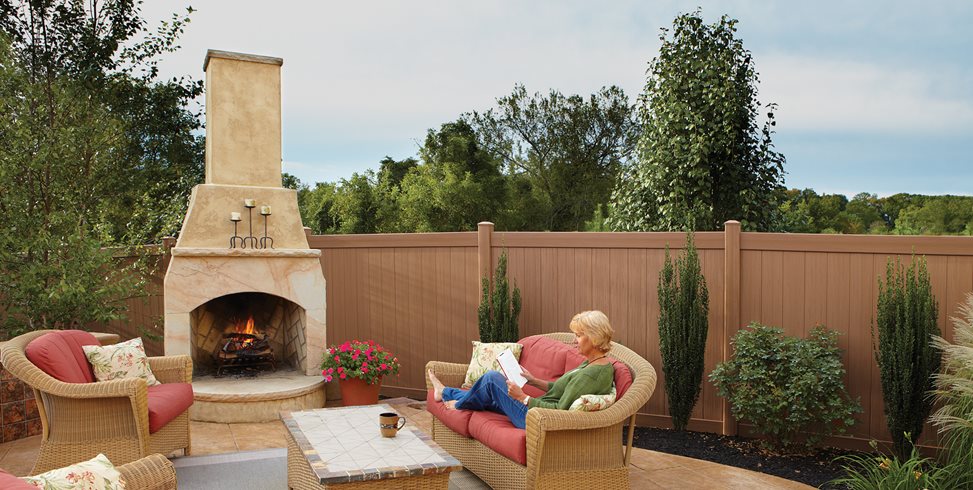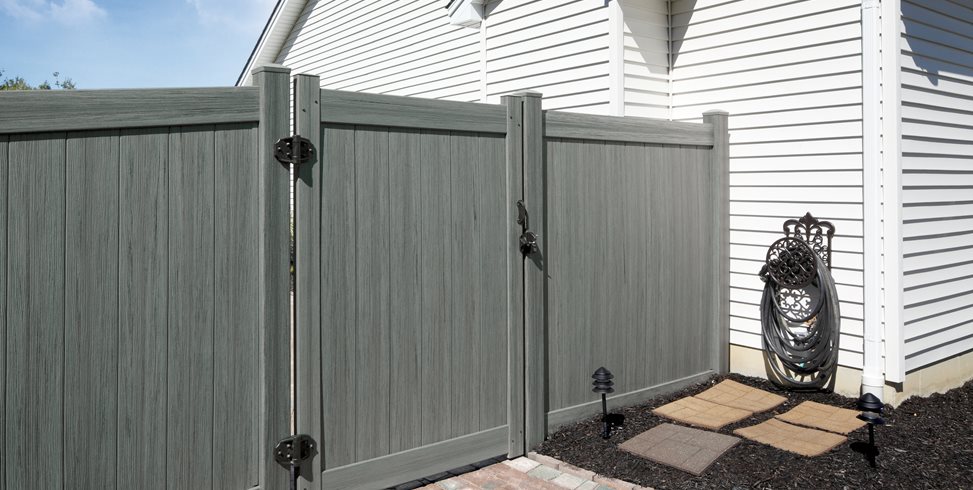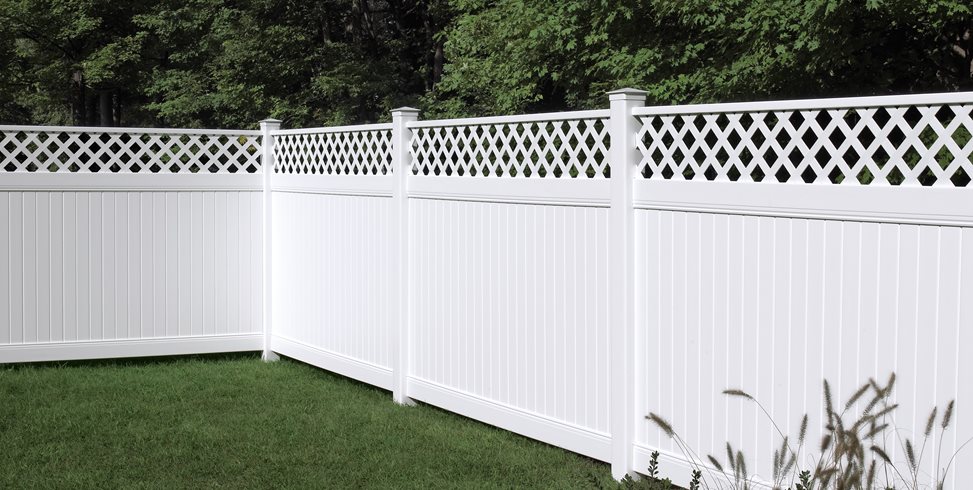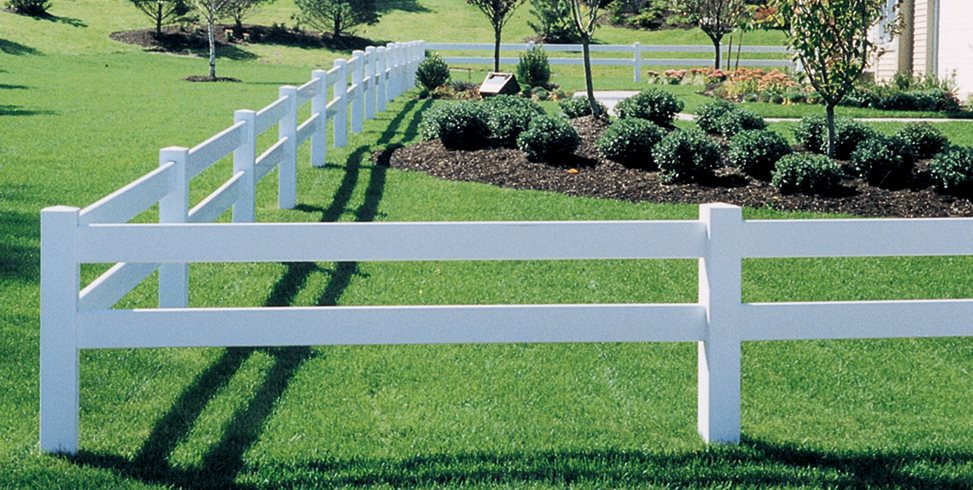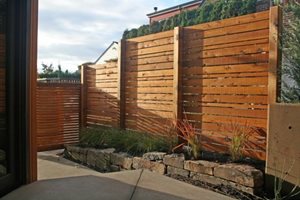Vinyl Fencing
A low-maintenance and durable fencing materialPros:
- Virtually maintenance free
- Never needs painting
- Won't split, crack or splinter
- Can be cleaned by spraying with a hose
- Unaffected by insects and rot
Cons:
- More expensive than wood
- Extreme temperatures can damage vinyl
- Color options are limited and may fade
- Repairs can be difficult
- May have mildew problems
The vinyl fence revolution is changing the way America looks at fencing. Nowhere is it more apparent than in the white picket fences that provide a welcome opportunity for front yard enclosure. Beautifully detailed New England style privacy fences offer a great alternative for rear and side yard enclosure too.
In the beginning vinyl wasn't well accepted, says Charles Shelton of Pacific Sunscapes in San Diego, California. "It was downright expensive and only for the wealthy. That's why it got a slow start. Then the price came down and the longevity went up so vinyl became an affordable option for most landscapes. We've done a lot of it within the last five years so it's on everyone's list - they see it and are attracted to it. When it comes to vinyl, people aren't looking at all the details. They want a clean and simple look with easy care and functionality."
"We find no-care vinyl fence costs the same to install (labor and materials) as wood fence which requires regular maintenance. Our vinyl 6' tall board fences average about $25 per linear foot, which is equal to that of a three rail wood fence with galvanized posts."
Not all brands of vinyl fencing are the same, however. Low grade vinyl is notoriously vulnerable to degradation from exposure to high UV light and extreme of temperature which make it brittle and cause cracking early on. Only top quality name brands are selected by installation contractors who depend on a reliable product that lasts. This alone is a good reason to hire a contractor to install vinyl fences. Pacific Sunscapes is convinced that their product is sustainable. "We're seeing no weather wear after ten years, even in areas inland where it can reach 120 degrees in the summer and snow in the winter. After a decade of exposure it still works perfectly."
CertainTeed vinyl fence manufactured in Chicago and Buffalo, New York is geared for the challenges of cold northern climates. Patti Pellock explains their trusted product. "We make our fencing to withstand the rigors of our cold winters and humid summers and have had no problems with weathering or fading."
Patti also details the addition of new natural looking vinyl fencing. "White vinyl sells well in New England, but to meet the demand of other markets, we developed our CertaGrain and CertaStucco textures to give our products a softer look. This is important with privacy fencing, which is our best seller. They wanted vinyl fences that blended into the landscape with the natural look of wood so we developed a range of natural colors to pair with our textured surfaces. They are adaptable many more architectural styles."
Vinyl Structure
Vinyl fence posts are hollow so they slide down over a wood fence post installed the traditional way. "We use a pressure treated wood core in concrete footing at the gates and ends/corners. The spans use lighter posts because vinyl fencing is counter-supportive and lighter weight than wood, so these posts are almost decorative, though they are thicker. Vinyl gates are lighter in weight than wood gates so we use them too." For really wide gates like those across a driveway, vinyl will often require some reinforcement to avoid sagging.
Patti Pollock says CertainTeed vinyl gates are aluminum reinforced within the vinyl to prevent sag. "We can do a single gate to 8 feet, double gates, and those which must adapt to a slope. We sell them preassembled for 3 to 5 foot openings. "
Vinyl fences are available in almost any style imaginable, but color is limited to white, light tan and dark tan. The unique details available such as lattice top panels or scalloped picket top panels offer affordable versions of otherwise costly woodworked fencing. Creative details also make these excellent privacy screens for enclosure or simply a freestanding partition within the landscape.
Vinyl is a great problem solver elsewhere too. This is proving a popular choice for split rail fencing of rural equestrian properties where horses chewing on wood fences and the annual whitewashing are both things of the past with vinyl fence. Vinyl also offers a great alternative to tubular steel for swimming pool safety enclosures.

 Backyards
Backyards
 Front Yards
Front Yards
